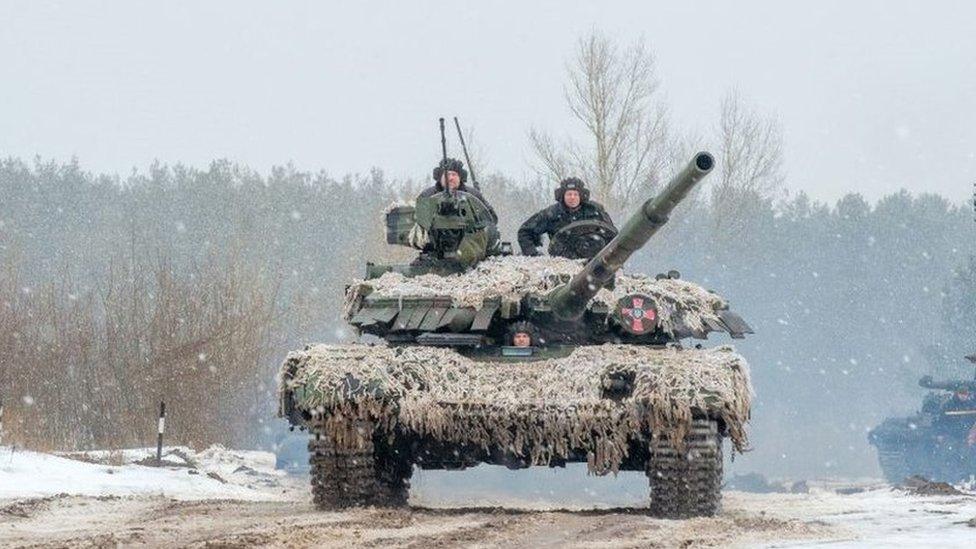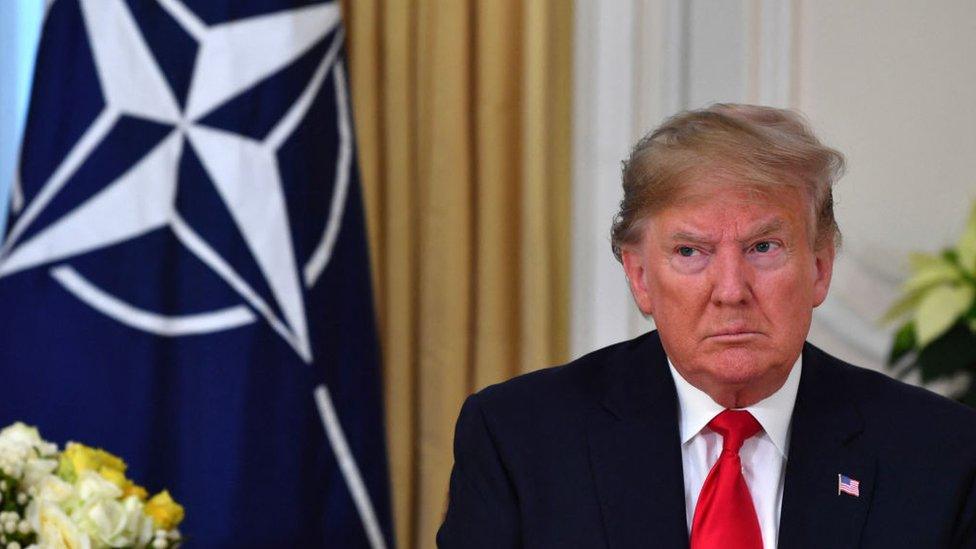The challenges of running a business in Ukraine's second city
- Published
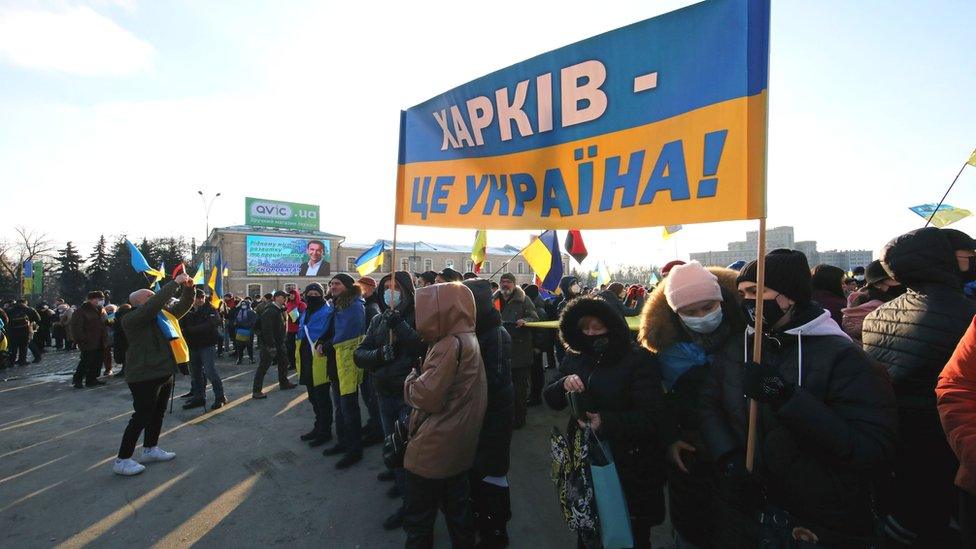
Activists hold a 'Kharkiv is Ukraine' banner aloft during the Unity March in February
What happens when your country faces invasion, and you just want to get on with running your business?
In Ukraine, there is a distinct sense of déjà vu for people running small and medium-sized businesses over the situation they now find themselves in.
Particularly in Ukraine's second city, Kharkiv, located just 26 miles (46km) from the border. Over 100,000 Russian troops are gathered at several strategic points along the border but Russia denies it is planning an attack.
Most Kharkiv entrepreneurs clearly remember the huge task they faced to reinvent themselves after the armed conflict in eastern Ukraine began back in 2014.
"Our clients are very concerned," says Roman Shekin, chief operating officer of the software company Zfort, in Kharkiv.
"What we're trying to tell them is, we're ready for any unexpected stuff, because we've been at war for a few years already."
In 2014, Russia seized then annexed Crimea, and fighting broke out in the Donbas region of eastern Ukraine, parts of which are now controlled by Russian-backed separatists.
Over the space of a few months, businesses in Ukraine lost the vast majority of their customers and suppliers in Russia. Overnight, the conflict cut off old, established cross-border ties. Many companies collapsed and many more had to start again from scratch.
For many it feels like their hard work to rebuild is about to be undone.
Zfort is one of thousands of Ukrainian IT companies that have flourished since 2014, creating apps and websites for clients in the US and Western Europe. Mr Shekin is trying to reassure his worried clients but some, he says, have put contracts on hold, waiting for more clarity.
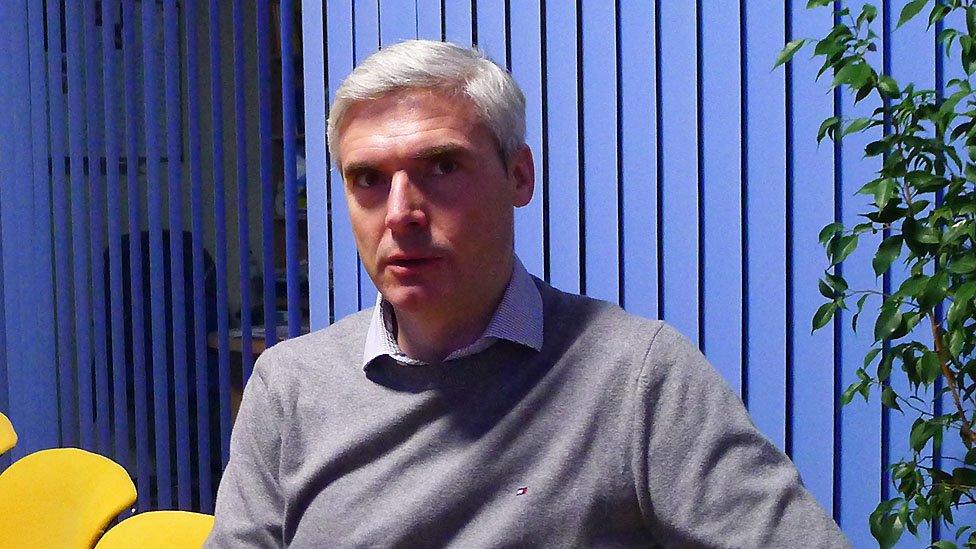
Roman Shekin's firm is part of the tech sector boom in Ukraine
He hopes to put their minds at ease by explaining Zfort's contingency plans. "All our infrastructure is cloud-based and hosted on European server. We can continue operations even if something happens to our offices here… our employees would just move to a safe place and connect remotely."
But for Kharkiv's traditional heavy industry, setting up remotely on a laptop is not an option.
Right in the centre of the city is the Kharkiv State Aircraft Manufacturer, where the flagship Antonov aircraft, was produced.
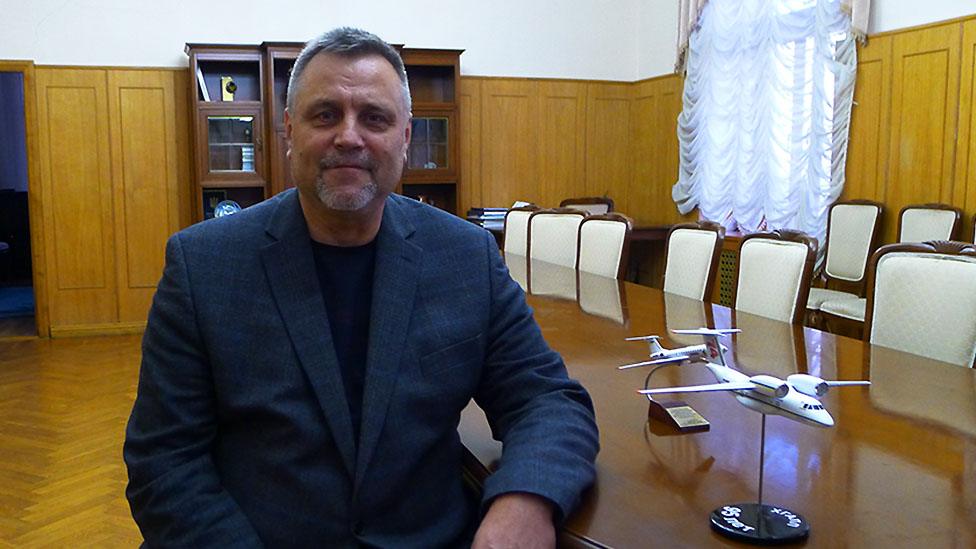
Defense is a big theme for entrepreneurs like Oleksandr Kryvokon
But no aircraft have been built here for eight years, because 70% of the components needed came from Russia. The firm is now $170m in debt, and has been trying to attract foreign investors to save it from bankruptcy.
Managing director, Oleksandr Kryvokon says any interest he has had from Western countries has dried-up. But since this latest ramping up of pressure from Russia at the border, he sees a potential opportunity.
Mr Kryvokon wants Ukrainian companies to collaborate with him on producing aircraft to defend their homeland. "Many factories started thinking, if there's a conflict what are we going to do to help Ukraine?" he says.
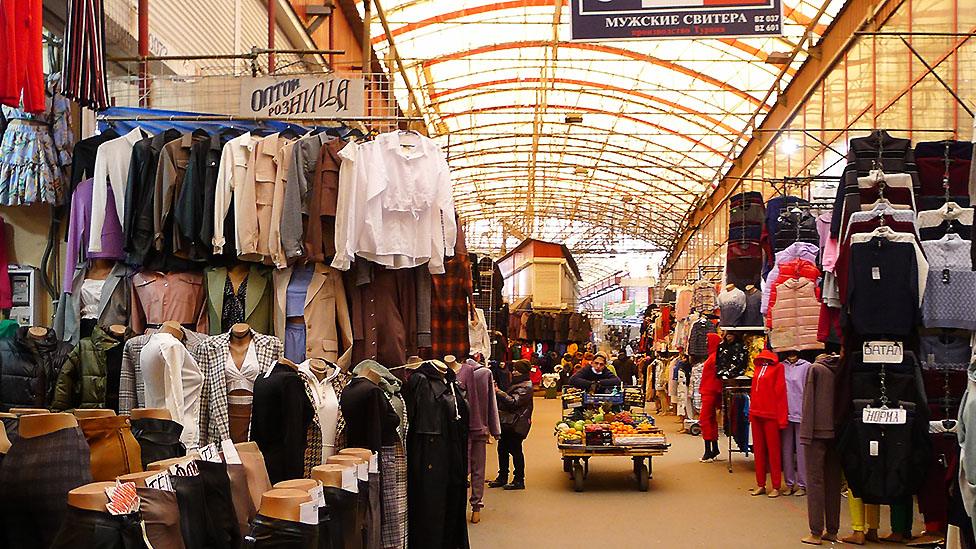
Barabashovo market contains a vast 15,000 shops and keeps many locals in employment
Across town is the huge market of Barabashovo. Pitching-in to shore up Ukraine's defence is a big theme for entrepreneurs here too.
It is the biggest market in eastern Europe, with 15,000 shops and 60,000 employees. One of them is Viktor Kuzmenko, who sells heating systems to the building trade.
When the conflict with Russia began in 2014, Mr Kuzmenko lost 70% of his business in a few short months - including almost all his loyal customers in Russia.
He just about managed to keep his business going, mostly through online sales.
January is usually pretty slow, but this past month he has made a loss. "I depend on people with big money, who are ready to invest in construction, and nobody's going to invest in building in a place where there's even the tiniest threat to it," he says.
Like many of his fellow entrepreneurs, Mr Kuzmenko has dug into his savings to support Ukrainian troops on the frontline. "My country's going through a particularly tense time, I couldn't stand on the sidelines," he says. With the money they raise, they buy tinned food, socks, and soap which are sent to the troops.
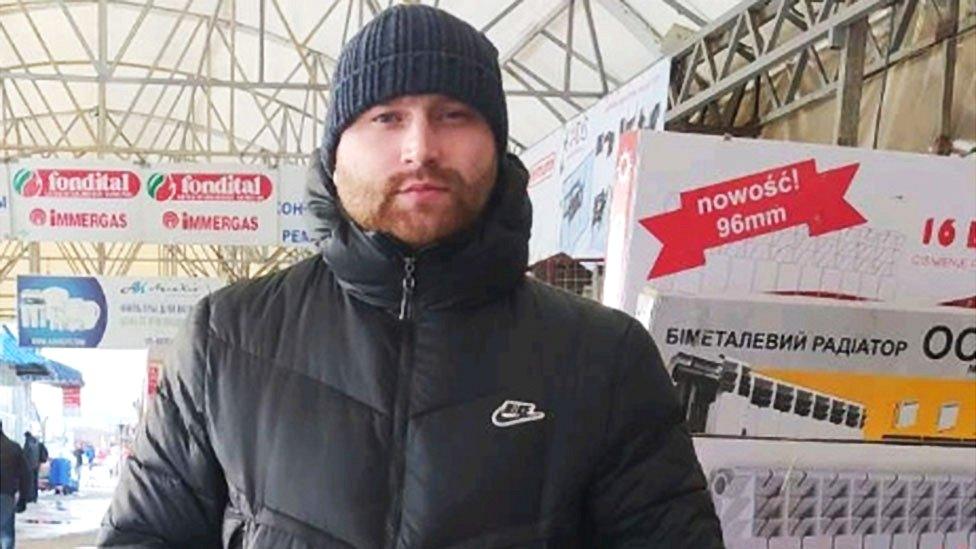
Viktor Kuzmenko sells heating systems to buyers in the construction industry
Mr Kuzmenko and many other business owners are mostly resigned to the threat their country faces and there's a sense of business as usual, according to Peter Dickinson, the publisher of Business Ukraine magazine.
"One of the key [Russian] narratives is that Ukraine is a failure - a chaotic, lawless, dysfunctional place - so, obviously damaging the economy is a big part of that [strategy]," he explains.
The knock-on effect of that is withdrawal of Western investment. "It makes Ukraine toxic," he adds, "because Ukraine becomes high risk all of a sudden."
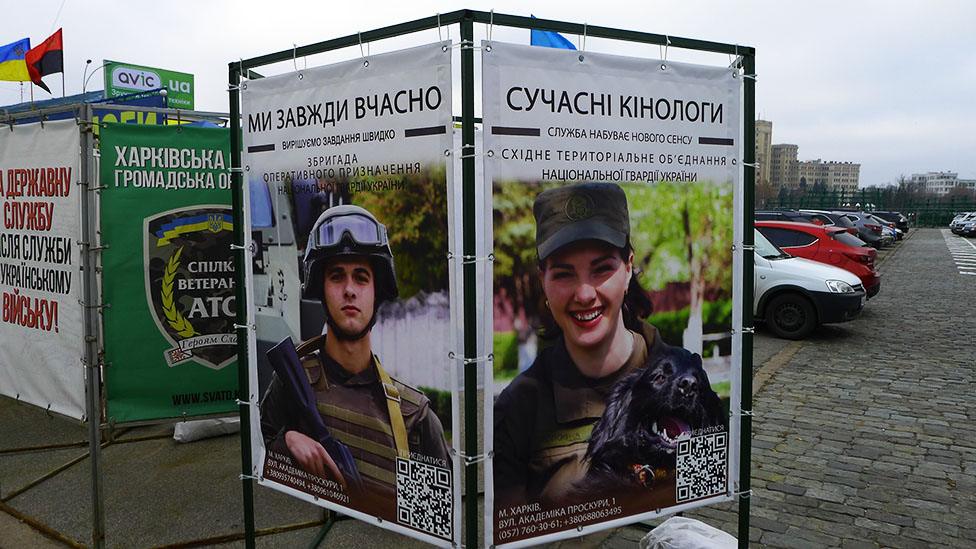
Posters recruiting volunteers are dotted around Ukraine's second city
Orysia Lutsevych, Head of the Ukraine Forum at Chatham House agrees there is a deliberate strategy to undermine Ukraine's modernisation …. "Russia will do everything to have Ukraine be this grey, buffer zone, where Russia will take over while the West will be too risk averse to engage with Ukraine."
Ms Lutsevych, says Ukraine needs external economic support to sustain its economy, and particularly to help small and medium sized business. This could come, she says, from places like the International Monetary Fund, the European Investment Bank, or the European Bank for Reconstruction and Development. She wants to see the creation of "new [financial] instruments to support small and medium businesses because they are taking the highest toll of the suffering, on top of Covid"
"Ukrainians have done remarkably well over the last eight years to rebuild the economy from the shocks of 2014, when the war began. This is a blow to them and quite deliberately so," says Mr Dickinson.
Others are hopeful that there will be a period of regeneration eventually, particularly for industries like design and engineering - mirroring the years that followed 2014. "After periods of crisis it's creative and new industries that flourish," says Dr Olga Onuch, associate professor in Politics, University of Manchester.
But for now, back at Zfort, Roman Shekin is hopeful the situation can be resolved soon. For now, he's telling his clients to hold their nerve.
He is also looking to the future: "We'll probably set up offices outside Ukraine in countries like Poland or Slovakia. We have to show our clients we can keep their projects safe and secure, no matter what."
Related topics
- Published24 February 2023
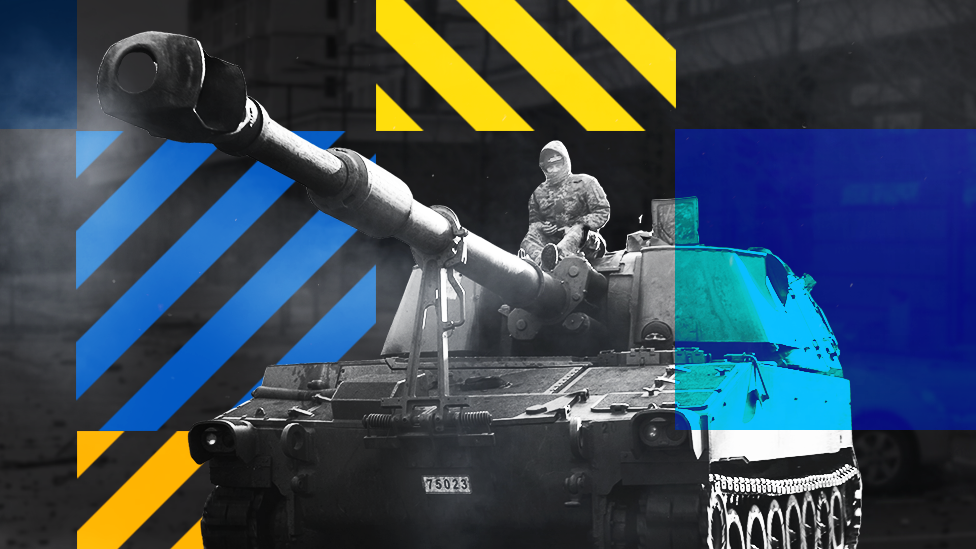
- Published11 February 2022
